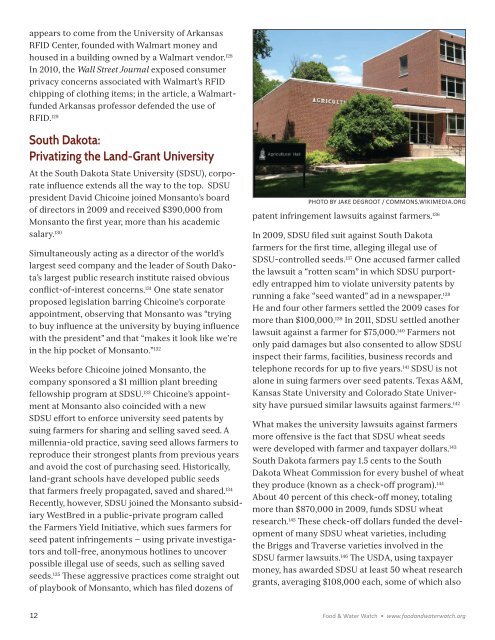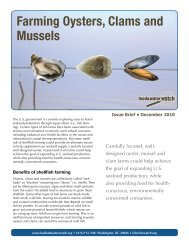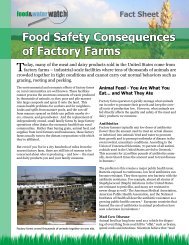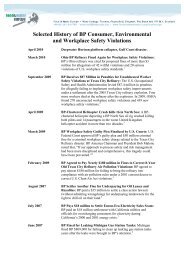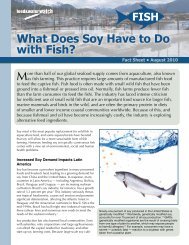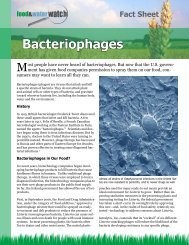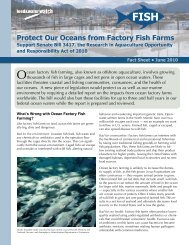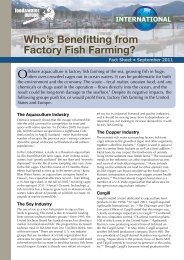Public Research, Private Gain - Food & Water Watch
Public Research, Private Gain - Food & Water Watch
Public Research, Private Gain - Food & Water Watch
You also want an ePaper? Increase the reach of your titles
YUMPU automatically turns print PDFs into web optimized ePapers that Google loves.
appears to come from the University of Arkansas<br />
RFID Center, founded with Walmart money and<br />
housed in a building owned by a Walmart vendor. 128<br />
In 2010, the Wall Street Journal exposed consumer<br />
privacy concerns associated with Walmart’s RFID<br />
chipping of clothing items; in the article, a Walmartfunded<br />
Arkansas professor defended the use of<br />
RFID. 129<br />
South Dakota:<br />
Privatizing the Land-Grant University<br />
At the South Dakota State University (SDSU), corporate<br />
influence extends all the way to the top. SDSU<br />
president David Chicoine joined Monsanto’s board<br />
of directors in 2009 and received $390,000 from<br />
Monsanto the first year, more than his academic<br />
salary. 130<br />
Simultaneously acting as a director of the world’s<br />
largest seed company and the leader of South Dakota’s<br />
largest public research institute raised obvious<br />
conflict-of-interest concerns. 131 One state senator<br />
proposed legislation barring Chicoine’s corporate<br />
appointment, observing that Monsanto was “trying<br />
to buy influence at the university by buying influence<br />
with the president” and that “makes it look like we’re<br />
in the hip pocket of Monsanto.” 132<br />
Weeks before Chicoine joined Monsanto, the<br />
company sponsored a $1 million plant breeding<br />
fellowship program at SDSU. 133 Chicoine’s appointment<br />
at Monsanto also coincided with a new<br />
SDSU effort to enforce university seed patents by<br />
suing farmers for sharing and selling saved seed. A<br />
millennia-old practice, saving seed allows farmers to<br />
reproduce their strongest plants from previous years<br />
and avoid the cost of purchasing seed. Historically,<br />
land-grant schools have developed public seeds<br />
that farmers freely propagated, saved and shared. 134<br />
Recently, however, SDSU joined the Monsanto subsidiary<br />
WestBred in a public-private program called<br />
the Farmers Yield Initiative, which sues farmers for<br />
seed patent infringements — using private investigators<br />
and toll-free, anonymous hotlines to uncover<br />
possible illegal use of seeds, such as selling saved<br />
seeds. 135 These aggressive practices come straight out<br />
of playbook of Monsanto, which has filed dozens of<br />
PHOTO BY JAKE DEGROOT / COMMONS.WIKIMEDIA.ORG<br />
patent infringement lawsuits against farmers. 136<br />
In 2009, SDSU filed suit against South Dakota<br />
farmers for the first time, alleging illegal use of<br />
SDSU-controlled seeds. 137 One accused farmer called<br />
the lawsuit a “rotten scam” in which SDSU purportedly<br />
entrapped him to violate university patents by<br />
running a fake “seed wanted” ad in a newspaper. 138<br />
He and four other farmers settled the 2009 cases for<br />
more than $100,000. 139 In 2011, SDSU settled another<br />
lawsuit against a farmer for $75,000. 140 Farmers not<br />
only paid damages but also consented to allow SDSU<br />
inspect their farms, facilities, business records and<br />
telephone records for up to five years. 141 SDSU is not<br />
alone in suing farmers over seed patents. Texas A&M,<br />
Kansas State University and Colorado State University<br />
have pursued similar lawsuits against farmers. 142<br />
What makes the university lawsuits against farmers<br />
more offensive is the fact that SDSU wheat seeds<br />
were developed with farmer and taxpayer dollars. 143<br />
South Dakota farmers pay 1.5 cents to the South<br />
Dakota Wheat Commission for every bushel of wheat<br />
they produce (known as a check-off program). 144<br />
About 40 percent of this check-off money, totaling<br />
more than $870,000 in 2009, funds SDSU wheat<br />
research. 145 These check-off dollars funded the development<br />
of many SDSU wheat varieties, including<br />
the Briggs and Traverse varieties involved in the<br />
SDSU farmer lawsuits. 146 The USDA, using taxpayer<br />
money, has awarded SDSU at least 50 wheat research<br />
grants, averaging $108,000 each, some of which also<br />
12 <strong>Food</strong> & <strong>Water</strong> <strong>Watch</strong>


